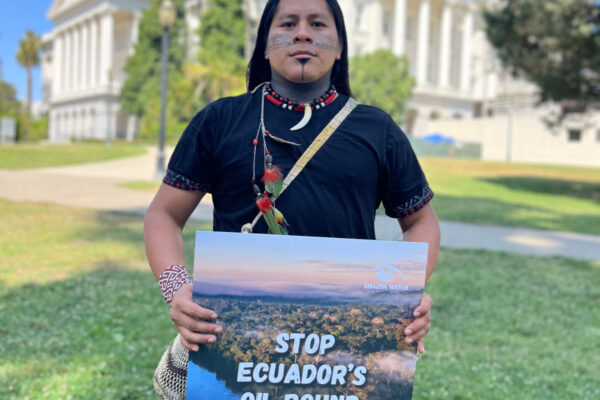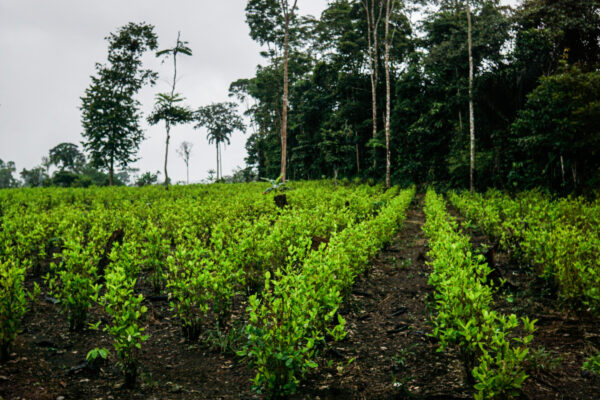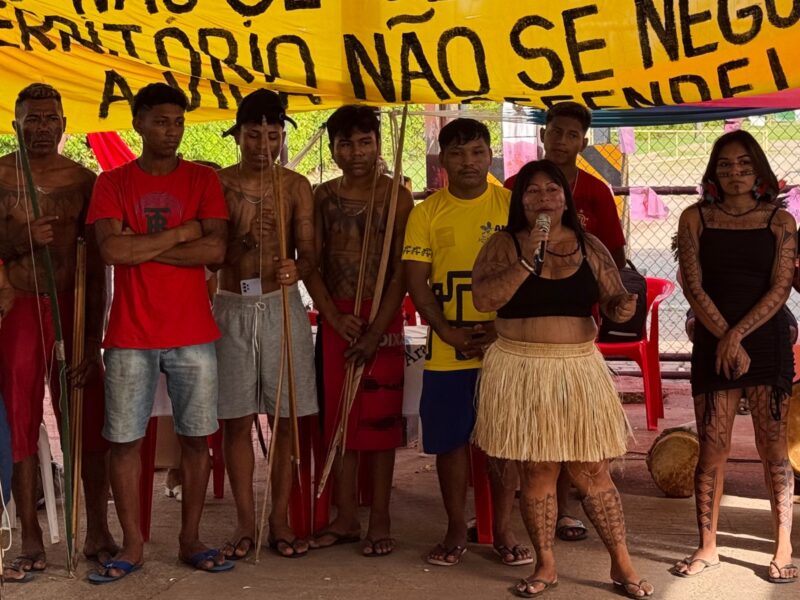Chief Raoni Metuktire, one of Brazil’s most respected Indigenous leaders and a global symbol of the struggle to protect the Amazon, gave an exclusive interview to O Globo just two months before COP30 begins in Belém.
In the conversation, Raoni raises concerns about the future of Indigenous territories and the climate, warning that both the Brazilian Congress and the current government are pushing forward destructive projects such as the “Devastation Bill,” the Marco Temporal (“Time Limit”) trick to limit recognition of Indigenous lands, railways through the rainforest, and oil exploration on the Amazon coast.
While Brazil presents COP30 as a landmark for climate diplomacy, Raoni’s words reveal a stark contradiction: the same government that promises climate leadership also supports initiatives that threaten forests, rivers, and the survival of Indigenous peoples. His message is clear: without a real commitment to protecting the Amazon and respecting Indigenous rights, global pledges will remain empty.
Read an English translation of the interview below.
Indigenous leader Raoni Metuktire ascended the ramp of the Planalto Palace alongside President Luiz Inácio Lula da Silva in January 2023, promising that the voices of Indigenous peoples would be included in the discussions of the incoming administration. Almost three years later, however, the chief assessed that the Workers’ Party leader failed to deliver on his promise by demonstrating support for projects with a significant impact on the territories of these communities.
On the eve of COP30, Raoni is also skeptical about the environmental meeting to be held from November 10 to 21 in Belém. The chief says he fears that a conference won’t be enough to curb deforestation in Brazil, and he also criticizes Congress’s actions regarding the approval of initiatives such as the timeframe for the demarcation of new reserves for Indigenous municipalities and the bill to relax environmental licensing. Some of the points most criticized by environmentalists were vetoed by Lula last month. “It’s very sad to see what’s happening,” laments the Indigenous leader, who believes there is no concern for preserving biodiversity for future generations.
Brazil will host COP30 this year in the heart of the Amazon. What do you expect from the conference?
“Perhaps this meeting in Belém is just a conversation, because deforestation will continue. In Itaúba, Mato Grosso, there is a lot of timber to be cut down. I’m very sad about that. I think the authorities need to get it right to prevent further deforestation. They need to ensure that the forests are preserved for the survival of us all.”
In addition to the timeframe for the demarcation of Indigenous lands, issues criticized by environmentalists, such as the bill for licensing and oil exploration in the Amazon River Basin, the Equatorial Margin, championed by President Lula himself, are moving forward and receiving support in Congress. Are you concerned about the actions of the parliamentarians?
“It’s very ugly to see what’s happening. Congressmen only think about destruction. On the contrary, they should think about the younger generation, so they have clean air to breathe. Representatives and senators want to destroy it for their own profits. We’re thinking individually, not about the bigger picture.”
Regarding the Ministry of Indigenous Peoples, has the ministry been able to fulfill its mission?
“It’s not good for the government to demand the ministry but not offer it autonomy. Resources are needed to facilitate Indigenous peoples’ access to knowledge about the mechanisms for this work, in addition to continuing efforts to defend their territory. This is how it should be.”
You climbed the Planalto ramp with Lula in 2023, and today the Ferrogrão project, which affects the land where you live in Mato Grosso, is part of the Growth Acceleration Program. How do you assess this scenario?
“You can never fool me, because I’m very attentive. When I was invited to climb the ramp with Lula, I accepted after extensive conversations with him. I told the president that any action or project that interferes with Indigenous land or our people must be consulted by us. I told Lula: ‘Don’t go by other people’s opinions. You can consult me on any matter and discuss it.’ Lula isn’t doing this, which isn’t good. Ferrogrão won’t be good for Indigenous or non-Indigenous people. The way the government is offering this project isn’t right.”
Do Indigenous people also fear the expansion of soybean production due to the project?
“Soybeans are not good for us Indigenous people. As a shaman, I see this happening and have been telling you, white people. But you are very stubborn and continue to cause devastation. My concern is that if this rate of destruction continues, we could have consequences such as disasters and threats to the lives of all humanity, not just us Indigenous people.”
How do you assess the damage caused by the fires in the communities of Mato Grosso?
“When a fire breaks out, government officials must take immediate action to combat them. I saw fire and many fires. I feel sad. This is not good and brings problems to the entire population.”
Context
After delays in internal discussions and a legal impasse, the federal government is awaiting a ruling from the Federal Supreme Court to proceed with the Ferrogrão project, a railway considered essential for agribusiness in the Central-West region. Raoni lives in the Capoto-Jarina Indigenous Territory, which could be impacted by the project.
Environmentalists fear the explosion of monoculture on the banks of Indigenous lands, such as Raoni’s, and cite the possibility of increased pesticide spraying that already contaminates rivers and fish. They also fear the rise of real estate speculation, persecution of defenders, land grabbing, and deforestation.
Listed as one of the projects under the new Growth Acceleration Program (PAC), the Ferrogrão railway is 933 kilometers long and will connect the cities of Sinop (MT), one of the largest grain producers in the country, and Itaituba (PA), on the banks of the Tapajós River.
The project was challenged in the Supreme Court because it cut through a federal reserve, the Jamanxim National Park. The route was redesigned, and, according to the government’s information to the Court, the issue has been resolved. However, there is still internal resistance, such as within the Ministry of the Environment.
In March 2024, Raoni delivered a ruling against Ferrogrão to Lula and French President Emmanuel Macron, issued by a court composed of representatives of Indigenous people, traditional communities, organizations, and social movements from Pará and Mato Grosso. The participants alleged violations of the right to free consultation and underestimation of environmental impacts, among other issues.
When contacted by O Globo, the Ministry of the Environment stated that the Ferrogrão project “plans for construction in an environmentally sensitive area” and must be “subjected to technically compatible analyses of the socio-environmental impacts of any potential implementation project, with a view to mitigating the anticipated repercussions.”
The analysis is being conducted by the Brazilian Institute of the Environment and Renewable Natural Resources (IBAMA) and is in its initial stages.
“Although not yet formally included in the approval process, the Ministry of the Environment and the Chico Mendes Institute for Biodiversity Conservation have submitted technical opinions that reinforce the scientific and legal basis for the environmental analysis.
Furthermore, the Deforestation and Burning Prevention and Control Plans already indicate actions to contain and prevent deforestation, as well as identify priority areas for compensatory plantings, a reforestation strategy that seeks to reduce the impacts of infrastructure works,” the ministry said.













